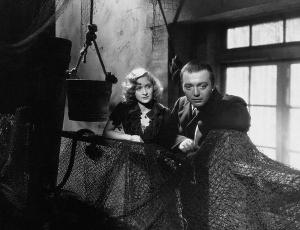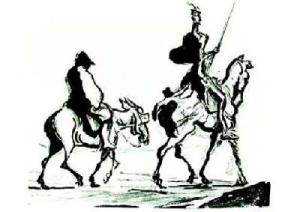February books
Our hiatus in Dushanbe and the slow start to a life with routine in Khujand gave me lots of time to read this month. Several of the books were on my sabbatical reading list and two of them were big – both in their size and in my interest to have them read.
Don Quixote by Miguel Cervantes (Vol. 1, 1605; Vol. 2, 1615)
It took me two months and three versions of the book before it was completed. At home in Bowling Green, I started the book with a book on tape with a version in modern English and, at the same time, had a book written in old, dense English to keep by my chair table and be able to read when the tape was bad. I had finished the first volume before we left, and started reading the version I have on the iPad, also a modern English translation, although not the same one, in Istanbul.
The book is picaresque, essentially just a string of stories, (much like the Chinese classic Journey to the West) so it was easy to set aside and then pick up again without losing the general plot. The book is in two volumes, and the first volume is much better than the first. The first volume has most of the familiar tales, plus there are stories embedded in stories embedded in stories – and the stories are more compelling. If you want to read Don Quixote, but don’t have time for a huge book, just read the first volume.
I thought that when I finally got around to reading the book, I would find the musical Man of La Mancha less satisfying. However, I am pleased to report that I still like the musical (although the movie with Peter O’Toole and Sophia Loren is pretty dreadful). In fact, finding the writers of the musical had used phrases and stories from the book made the book seem like an old friend.

Crime and Punishment with Peter Lorre and Marian Marsh in the 1935 movie directed by Josef von Sternberg.
Crime and Punishment by Fyodor Dostoevsky
First published in 12 installments in 1866, this book has been on my must read list for decades, really. I decided that living in the former USSR might be a good time to read some big Russian literature books. It is, and this book is wonderful. It is a perfect “dark night of the soul,” and should have been read for the first time when I was a teenager. Compelling writing and emotionally wringing. Peter Lorre, however, was not a good choice to play Raskolnikov – Ralph Fiennes when younger would have been perfect.
Dr. Thorpe by Anthony Trollope, first published in 1858.
This is a sweet, but contrived story. While the plot could have been handled in a short story, the characters, the vocabulary and the depiction of middle class, small town village life in the 1800s delights. I also like how the author comments on his own writing – sort of post-modern, eh? This is the third of the Barchester series, I’ve already read the first two and I plan on reading more.
Candide by Voltaire, first published in 1759.
Another classic I should have read long ago. This novella is a satire about the philosophy that says that if God is good, then everything that happens must be for the good. It got on my “must read” list when one of my freshman students told me it was his favorite book. Thank you Alex, it is good.
Celtic Twilight by W.B. Yeats, mostly written in 1902.
Yeats is on my Nobel prize list, which I am trying to work through. He is best known for his poetry, but I was tempted by the title and that it was essays about Irish folk beliefs. It was a quick read, but not very satisfying. It did include a few stories and some short poems, but the essays didn’t really enlighten me much about Irish peasants. I am looking forward to reading his collection of Irish fairy tales, which I believe, are the actual fairy tales rather than his commentary on bits and pieces of them.
Rock the Casbah by Robin Wright (2011)
My friend Catherine gave this book to me as a Christmas gift, and it was well worth reading. I recommend it to everyone who is interested in how 9/11 has affected Muslims and what they are doing to combat extremism in their religion. Wright, a journalist, has been covering the Middle East (and elsewhere) since the 1970s. She reports on the counter-jihad, including hip-hop music, stand up comedians, plays, cultural and political activists, and reformed supporters of terrorism. I will use this as one of the books I recommend for the required book report assignment in my fall class, and probably for both journalism and international studies classes for several years. It is eye-opening.
Confessions of an English Opium Eater by Thomas de Quincey (originally published in 1821-22 in a London magazine in three installments.)
A short book that has been sitting on my shelves for years and which I could download onto the iPad for free, so it came with us. I only recommend it if you want to read all of the British classics. Taken at face value, de Quincey was a long time user of opium. For eight years he took it every three or four weeks for pleasure, and then, he began to take it as a remedy for pain and became a daily user. Because of the emotional turmoil it caused him (lack of sleep and when he did, hideous dreams), he eventually weaned himself. Because he thought that what he had read about opium being used casually was wrong, and because he wanted to show that it was possible to wean yourself off if you did become addicted, he wrote the book. Frankly, it made me want to try a little opium.
Eva Luna by Isabelle Allende, published in Spanish in 1987.
The title character is a story teller who lives in an unnamed South American country during the middle of the 20th century. She tells us the about her life and the lives of several other characters, with whom she eventually meets. It is full of rich characters, and the protagonist is interesting in herself. But, even though the book is fiction, you wonder about the stories that Eva tells you. Even within the parameters of the story, are her stories true?
The Girl Who Played with Fire by Stieg Larsson, published in Swedish in 2006.
After seeing the three Swedish movies based on this wildly popular trilogy, I decided to give one of the books a try. The idea was to read the first one (Girl with the Dragon Tattoo), but this, the second book, showed up on the US Embassy library shelf, and so I read it to see if the books were that much better, as I had been told. Here’s the verdict. If you have not yet seen the Swedish movies, and you like murder mysteries with sex and violence, read the Dragon Tattoo book and check it out. If it is what you like, then read the rest. Yes the books are better than the movies, because they are richer in detail and you get more of the psychology behind the characters – as well as some extra scenes. But the book wasn’t so much better that I have to read the others. I wish I had read the books rather than seen the movies. I find sex and violence entwined is easier for me to take in a book than on a screen. I will likely skip the new English language version of the movie, unless it is in easy reach on a day that I am bored.
A Long Way Home by Ishmael Beah. Published in 2007, 10 years after he was a child soldier in Sierra Leone.
Another free book on the embassy library shelf. So glad I picked it up. I will add this to my book report assignment list for the international studies class. It’s an incredible story written by a young man who at 12, found himself harshly affected by the Sierra Leone civil war and was eventually pressed into being a child soldier. He was lucky enough to be rescued through UNICEF and he includes in his narrative the process of being emotionally and physically healed from that trauma. The book was written about 10 years after the time that the book covers, and I don’t think it could have been written any sooner, Beah writes with clarity. I highly recommend this book.


Wow, you’re really going to stave off dementia with that brain workout. When I first got to uni, fresh out of the most narrow, restricted, awful Catholic school I took a lit class called Fate, Freedom, Guilt and Responsibility – I’ve never forgotten it. The tutor was a young American woman called Barbara Milech. We had to read and commment on one text per week – the first was the Book of Job, but soon enough it was Don Quixote (in one week) and then Crime and Punishment (in one week) – it ended with Catch 22. I could literally feel my mind being prised open, wider and wider …. it all fitted in with the times: life was suddenly exciting, liberating, meaningful. Do you think young people still get that at University?
With Don quixote I felt the same as you – story after story – yet by the end I loved those two characters, and it made you think about what is really important about life. A great book to read when you’re 17.
Crime & Punishment I did not like. Yes, the ideas were interesting, and remain so, but I reckon if I were given the task of editing it I could make a better book that was half as long. Candide I loved and I enjoyed responding to an economics professor, who not long ago, asked on his blog, what books his students should read – he meant the god-awful neo-liberal market-loving tripe that economists are so fond of. I thought Candide might teach them a thing or two.
It was probably in that course that I came across Camus – another author that I just had to read every word he ever wrote. And that led on to Saint-Exupery and Simne De Beauvoir ….. Lord, if I could only devour books like I used to be able to. I’m such a slow reader now, and if a book starts to get depressing, I just stop reading. Did you ever read Disgrace by Coetzee? Pushed me into the only episode of real, couldn’t-get-out-bed-for-a-month depression I’ve experienced.
I miss Trollope! For a few years I caught the train to work (I went back to car commuting and paying huge parking fees because the train eventually became too crowded) and I was happily reading my way through Trollope. You always want a Trollope with you on a train trip. The only danger is feeling silly when you laugh out loud. I read The Way We Live Now at a time when the exact same thing was happening in Western Australia – a hundred years later. Trollope is so contemporary.
Never liked Yeats – too much Yeats at (Catholic) school.
I never think much about ‘the classics’ now – too busy reading blogs – but have you read George Eliot? If not try The Mill on the Floss – one of my all-time favourites. I liked all her novels, but the famous Middlemarch, least.
Another author I read on the train was H.G.Wells – I read everything he wrote, apart from the science fiction, which I can’t stand, but try The History of Mr Polly – it’ll be free to download somewhere.